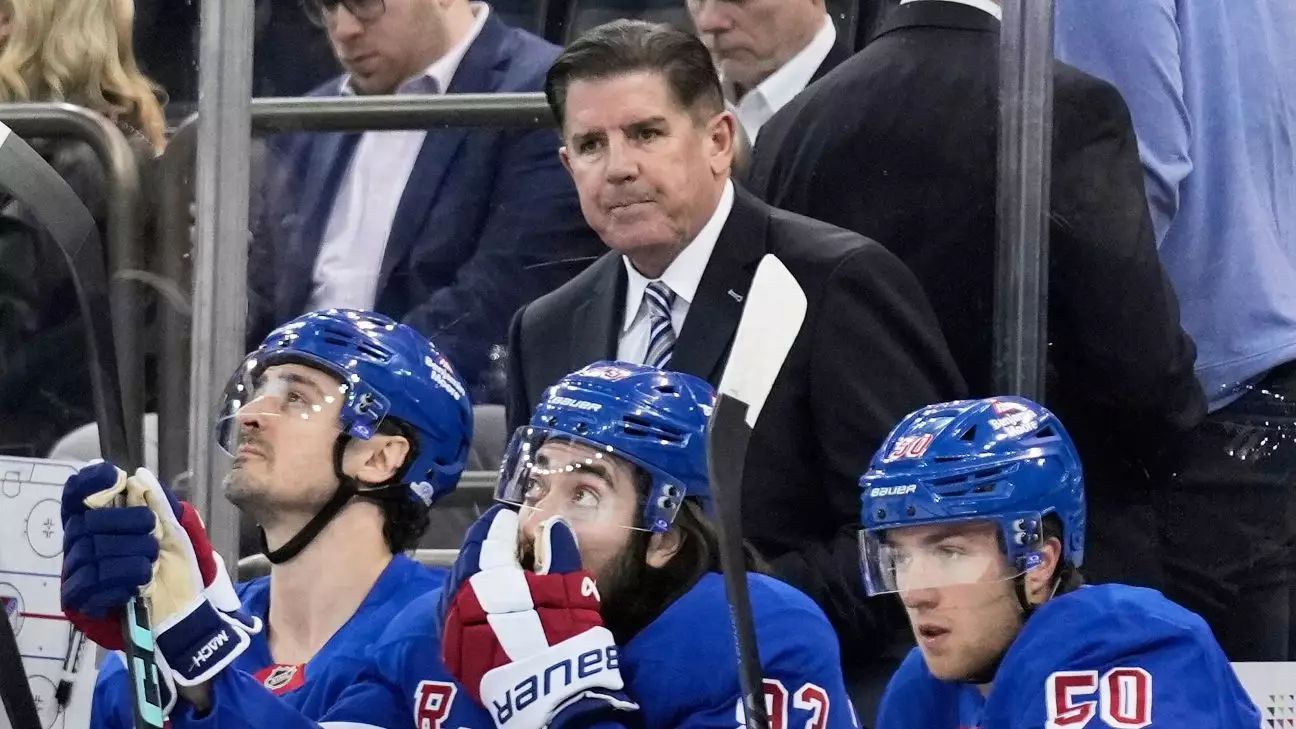The New York Rangers’ abrupt decision to fire head coach Peter Laviolette is less a reflection of Laviolette himself and more an indictment of organizational chaos that has become synonymous with the franchise in recent years. The departure of Laviolette, coming on the heels of a disappointing season that followed a promising playoff run, raises critical questions about the culture at Madison Square Garden. It’s a pattern of instability that begs for introspection: are the Rangers ever able to sustain a coaching vision, or are they doomed to repeat past mistakes in the relentless pursuit of success?
The announcement from general manager Chris Drury describes Laviolette as “first class” and expresses gratitude for his time. However, the warm sentiments ring hollow when stacked against the backdrop of a franchise that has now cycled through four head coaches since 2021. Each firing serves as a reminder that the organization is scrambling to find clarity and consistency, rather than searching for a way to foster an enduring legacy of winning.
High Expectations, Dismal Execution
Entering the most recent season, the Rangers were heralded as potential Stanley Cup contenders, buoyed by a fruitful previous season that ended in the Eastern Conference finals. Yet, early success quickly turned sour; a promising 12-4-1 start eroded into an abyss of losses. The team’s struggle to maintain consistency can’t solely be placed at the feet of the coaching staff. On the contrary, it highlights a systematic failure within the franchise’s decision-making and player management processes.
The Rangers’ approach to roster changes during the season presents a perfect case study in reactive rather than proactive management. The trade of captain Jacob Trouba, coupled with the departure of promising forward Kaapo Kakko, reflected desperation more than a calculated strategy. The fervent roster reshuffle, characterized by chaotic trades like reacquiring J.T. Miller and dealing with multiple other player movements, signifies a lack of cohesion—not just among players, but from the front office.
Laviolette’s time with the Rangers was marked by impressive statistics, including a record-setting 55-win season. But wins alone do not guarantee stability, nor do they suffice in masking systemic issues. The crux of the team’s problems might lie in the organization’s perpetual cycle of dysfunction, manifested most glaringly through its inability to establish a coherent identity or philosophy under a single coach.
Outside Looking In: A Coaching Search with Little Grounding
Following Laviolette’s dismissal, the Rangers are now confronted with the unenviable task of conducting yet another coaching search, reportedly looking beyond their own ranks to secure fresh talent. Names such as John Tortorella and Joel Quenneville circulate through discussions, yet the Rangers must be cautious: hiring another coach without a clear vision or commitment to a coherent playing style is a dangerous and repetitive misstep.
There’s an unsettling irony in seeking out proven veterans or high-profile names without addressing the root issues plaguing the organization. The NHL coaching landscape is saturated with gurus ready to impart their wisdom, but the question remains: can any coach truly be successful in an environment that oscillates between reactionary decisions and ill-defined goals? The history of coaches in New York suggests otherwise.
The task ahead demands far more than simply ticking names off a list. It requires true introspection—an examination of the player dynamics, front office communications, and most critically, the culture nurtured within the organization. Without a deep, honest evaluation of why previous coaches have failed, the Rangers risk finding themselves in another vicious cycle—a carousel of coaching changes that leads only to further disappointment.
The Fans Deserve More
Amid this turmoil, what remains most troubling is the impact on the fanbase. For decades, Rangers’ supporters have endured heartbreak and frustration, fervently hoping for a resurrection of glory amid the missteps. The inconsistency at the helm only fuels the discontent, transforming hopeful anticipation into a lingering sense of betrayal.
As the franchise stands on the precipice of another coaching search, it is essential for management to recognize that the ultimate goal must revolve around stability, vision, and a commitment to nurturing talent. The fans deserve more than superficial changes; they deserve a roadmap—a vision. Firing a coach only to cycle in another without addressing foundational issues will not appease the loyal Rangers supporters, who yearn for a team that reflects their passion and commitment.


Leave a Reply